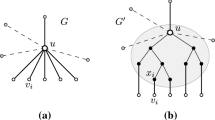Abstract
Protocols belonging to the Spanning Tree Protocol (STP) route traffic demands on tree topologies that are evaluated through shortest path procedures. In this paper we deal with the problem of assigning costs to the arcs of a network in order to guarantee that SPT protocols efficiently re-route traffic demands in failure situations: namely, without redirecting traffic demands that are not affected by the failure. We say that a communication network has the local tree-restoration property if there exists a set of costs for its arcs such that the above property holds.
We show that an undirected network has the local tree-restoration property if and only if it is 2-connected. In particular, we provide a quite simple procedure for assigning costs to the arcs of a 2-connected network so that the property holds. For the directed case, we show that deciding whether a network has the local tree-restoration property is NP-hard, even in some “simple” cases.
Preview
Unable to display preview. Download preview PDF.
Similar content being viewed by others
References
Brightwell, G., Oriolo, G., Sheperd, F.B.: Reserving Resilient Capacity in a Network. Siam Journal on Discrete Mathematics 14(4), 524–539 (2001)
Flocchini, P., Pagli, L., Prencipe, G., Santoro, N., Widmayer, P.: Computing all the best swap edges distributively. Journal of Parallel and Distributed Computing 68(7) (2008)
Grötschel, M., Monma, C.L., Stoer, M.: Design of survivable networks. In: Handbook in OR and MS, vol. 7, pp. 617–672. Elsevier, Amsterdam (1995)
Kolarov, A., Sengupta, B., Iwata, A.: Design of Multiple Reverse Spanning Trees in Next Generation of Ethernet-VPNs. In: IEEE GLOBECOM 2004, vol. 3, pp. 1390–1395 (2004)
Nardelli, E., Proietti, G., Widmayer, P.: Swapping a Failing Edge of a Single Source Shortest Paths Tree Is Good and Fast. Algorithmica 35, 56–74 (2003)
Padmaraj, M., Nair, S., Marchetti, M., Chiruvolu, G., Ali, M.: Traffic Engineering in Enterprise Ethernet with Multiple Spanning Tree Regions. In: Proc. of System Communications (ICW 2005), Montreal, Canada, pp. 261–266 (2005)
Sharma, S., Gopalan, K., Nanda, S., Chiueh, T.: Viking: A Multi-Spanning-Tree Ethernet Architecture for Metropolitan Area and Cluster Networks. In: IEEE INFOCOM 2004, vol. 4, pp. 2283–2294 (2004)
de Sousa, A.F., Soares, G.: Improving Load Balance and Minimizing Service Disruption on Ethernet Networks using IEEE 802.1S MSTP. In: Proc. EuroFGI Workshop on IP QoS and Traffic Control, Lisbon, Portugal, vol. 1, pp. 25–35 (2007)
Sperduto, E.: Combinatorial structures in communication networks, Ph. D. thesis in Computer Science and Automation, Università Roma Tre (2008)
Tarjan, R.: Depth-first search and linear graph algorithms. SIAM Journal on Computing 1(2), 146–160 (1972)
Standard IEEE 802.1D
Standard IEEE 802.1s
Standard IEEE 802.1w
Author information
Authors and Affiliations
Editor information
Editors and Affiliations
Rights and permissions
Copyright information
© 2009 Springer-Verlag Berlin Heidelberg
About this paper
Cite this paper
Iovanna, P., Nicosia, G., Oriolo, G., Sanità, L., Sperduto, E. (2009). Local Restoration for Trees and Arborescences. In: Valadas, R., Salvador, P. (eds) Traffic Management and Traffic Engineering for the Future Internet. FITraMEn 2008. Lecture Notes in Computer Science, vol 5464. Springer, Berlin, Heidelberg. https://doi.org/10.1007/978-3-642-04576-9_9
Download citation
DOI: https://doi.org/10.1007/978-3-642-04576-9_9
Publisher Name: Springer, Berlin, Heidelberg
Print ISBN: 978-3-642-04575-2
Online ISBN: 978-3-642-04576-9
eBook Packages: Computer ScienceComputer Science (R0)




